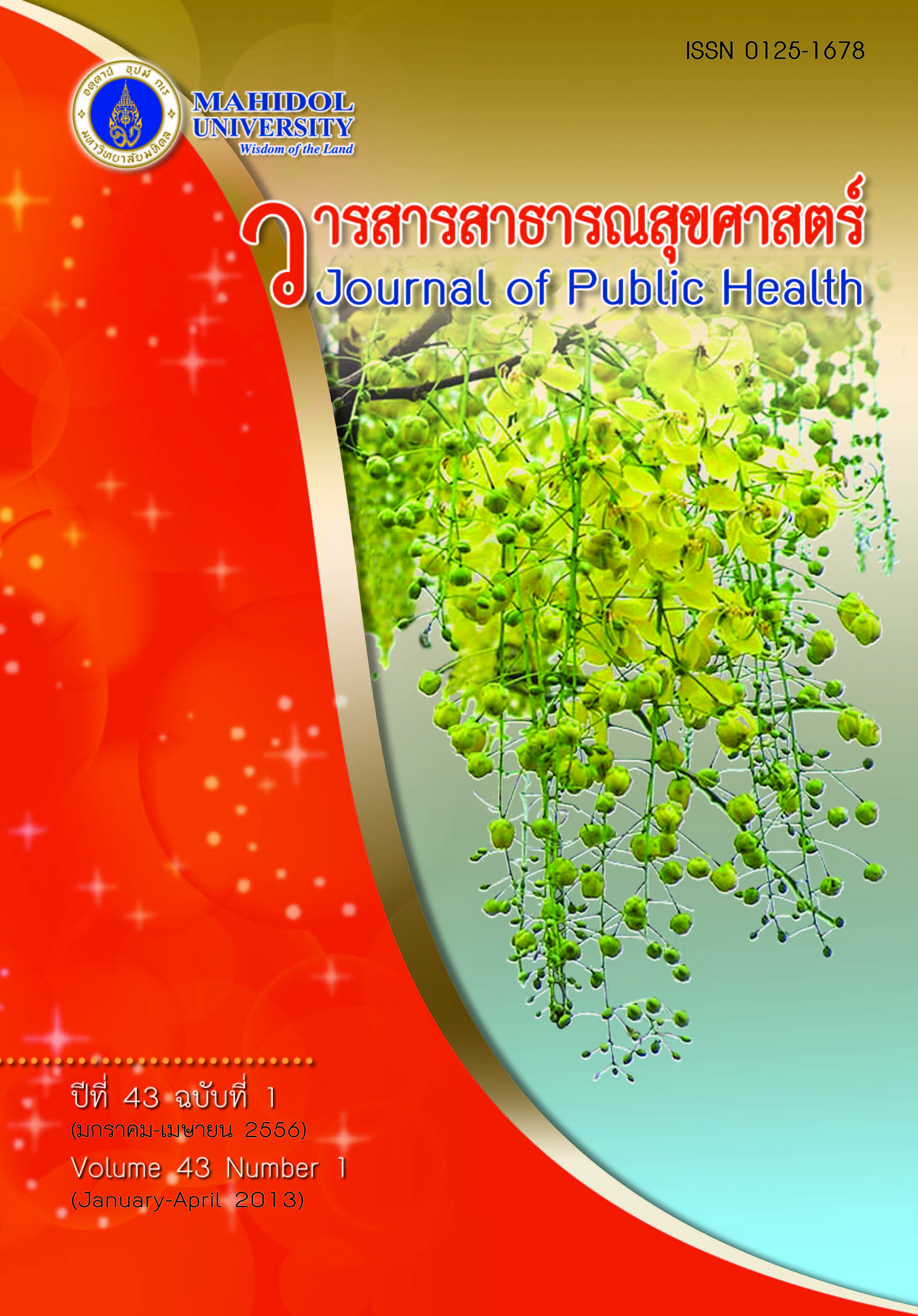ภาวะสุขภาพและการรับบริการสุขภาพของแรงงานข้ามชาติชาวลาว ในภาคการผลิตเกษตรกรรมของภาคอีสาน
Keywords:
ภาวะสุขภาพ การรับบริการสุขภาพ แรงงานข้ามชาติชาวลาวAbstract
บทคัดย่อ
งานวิจัยนี้มีวัตถุประสงค์เพื่อศึกษาภาวะสุขภาพและการรับบริการสุขภาพของแรงงานข้ามชาติชาวลาว ในภาคการผลิตเกษตรกรรม เป็นการวิจัยเชิงคุณภาพ เก็บข้อมูลโดยวิธีการสัมภาษณ์เชิงลึกตามแนวทางการสัมภาษณ์ ในกลุ่มแรงงานข้ามชาติชาวลาวที่ทำงานในภาคเกษตรกรรม จำนวน 25 คน ในพื้นที่จังหวัดขอนแก่น หนองบัวลำภู และชัยภูมิ ระหว่าง พฤษภาคม 2551- เมษายน 2552 วิเคราะห์และนำเสนอข้อมูลโดยการพรรณนาวิเคราะห์ (Descriptive Analysis) ผลการวิจัยพบว่า ภาวะสุขภาพของแรงงานข้ามชาติชาวลาวที่ทำงานในภาคการผลิตเกษตรกรรม มีภาวะเสี่ยงด้านสุขภาพสูง โดยใน 1) มิติสุขภาพกาย พบว่าเป็นโรคอ้วน เจ็บป่วยจากโรคติดต่อ มีโอกาสติดสารเสพติด มีการใช้ยาชุดและเกิดอุบัติเหตุ 2) มิติสุขภาพจิตใจ พบว่า มีความเครียดจากการใช้ชีวิตเพราะต้องปรับตัว และการทำงานต่างถิ่นภูมิลำเนา 3) มิติสุขภาพสังคม พบว่า มีความไม่มั่นคงในการดำเนินชีวิต มีความกลัว และความอดอยาก และ 4) มิติสุขภาพปัญญา พบว่า แรงงานข้ามชาติชาวลาวขาดความรู้ด้านการส่งเสริมสุขภาพและขาดทักษะการสื่อสาร แรงงานข้ามชาติชาวลาวได้พยายามดูแลสุขภาพตนเองใน 3 รูปแบบ ได้แก่ ดูแลด้วยตนเอง โดยเครือข่ายทางสังคมและโครงสร้างระบบสุขภาพของรัฐไทย ซึ่งสามารถดูแลสุขภาพได้ครอบคลุมทุกมิติ ทั้งมิติทางร่างกาย (เช่น ออกกำลังกาย ควบคุมอาหาร เลือกใช้บริการสุขภาพของรัฐ) มิติทางจิตใจ (เช่น นอนพักผ่อน ดูภาพยนตร์ ฟังเพลง ให้กำลังใจและแสดงความชื่นชม) มิติทางสังคม (เช่น เคารพวัฒนธรรมท้องถิ่น แบ่งปัน เกื้อกูลกัน) และ มิติทางปัญญา (เช่น การขัดเกลาทางสังคมในกลุ่ม) แต่การดูแลสุขภาพในหลายรูปแบบดังกล่าวยังขาดความถูกต้องในการส่งเสริมสุขภาพ การป้องกันโรค การรักษาพยาบาลเบื้องต้นและการฟื้นฟูสุขภาพ อันเนื่องมาจากความเป็นชายขอบทางสังคม การเข้าไม่ถึงชุดสิทธิประโยชน์ในระบบประกันสุขภาพ และความเป็นภาคการเกษตรในระบบทุนนิยม ดังนั้นจึงควรควรใช้ภาษาถิ่นในกิจกรรมด้านสุขภาพในกลุ่มแรงงานข้ามชาติในภาคเกษตรกรรม และส่งเสริมให้เกิดเครือข่ายทางสังคม เพื่อการสนับสนุนและดูแลซึ่งกันและกันด้านสุขภาพ พร้อมทั้งควรเพิ่มมาตรการในการเฝ้าระวังและป้องกันโรคระบาดที่อาจจะเกิดขึ้นได้ในกลุ่มแรงงานข้ามชาติ
ABSTRACT
The objectives of this study were to describe the health status and the health services accessibility of transnational agricultural migrants from Laos PDR. The qualitative study used in-depth interviews to collect data from 25 agricultural migrants from Laos PDR working in provinces in the northeast region of Thailand including Khon Kaen, Nong Bua Lam Phu and Chai-Ya-Phum. Data were collected from May 2008 - April 2009. The results of descriptive analysis showed that the health status of Laotian agricultural workers was high-risk in all health dimensions: 1) physical health [fat, communicable diseases, drug usage, and accidents], 2) mental health [seriously from fear], 3) social health [insecurity and fears about livelihood], and 4) spiritual health [lack of health promotion knowledge and un-communicated skill]. They maintain their health in three ways, namely through self-care, social networks, and services from the Thai government health system. Besides this, the migrants provide self-care in four dimensions consisting of physical health (exercise, diet, access to government health services), mental health (bed rest, seeing a movie, singing and appreciation response), and social health (respecting cultural norms and creating spiritual health through socialization). Regardless of their self-care behaviors, the Laotian workers lacked knowledge of health promotion, preventive measures, primary health care, and rehabilitation. They occupy a marginal position in society and have little access to health insurance. Consequently, recommendations from this study include using the local dialect to communicate with transnational agricultural migrants regarding health activities, and empowering social networks within the community in terms of healthcare. In addition, preventive measure should be more focused on preventing and monitoring diseases which are likely to affect transnational labor groups.
Downloads
Published
Issue
Section
License
Creative Commons License CC-BY-ND


